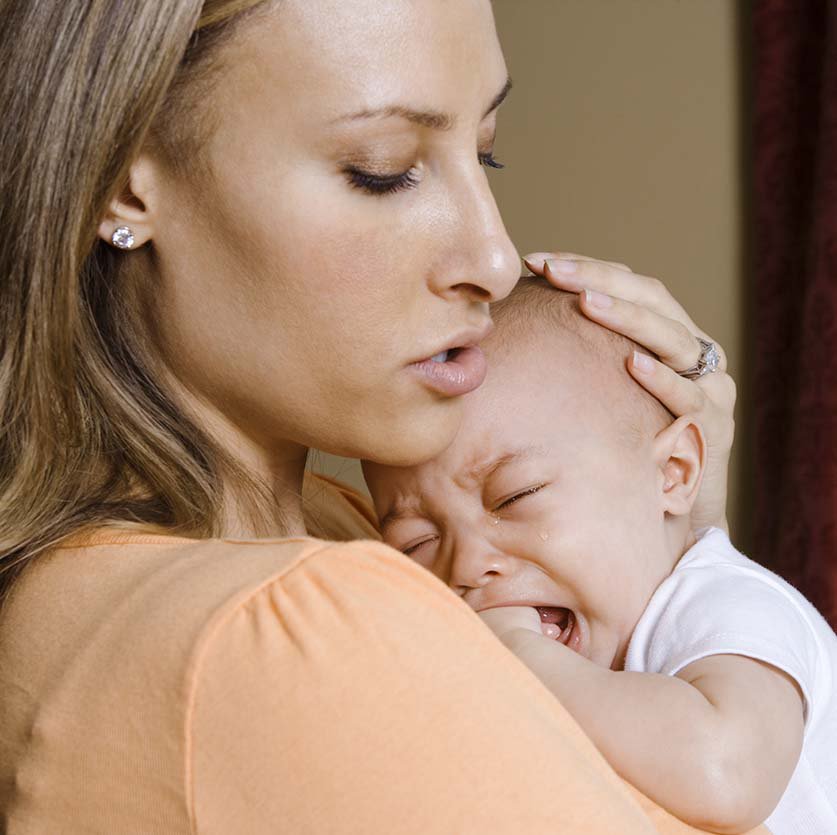 Your baby has just made a grand entrance into the world. You are so thrilled! However, you have just one problem, she cries…no, she cries a lot! You must remember that your new baby is adjusting to a whole new world around her filled with faces, voices, smells, and sounds.
Your baby has just made a grand entrance into the world. You are so thrilled! However, you have just one problem, she cries…no, she cries a lot! You must remember that your new baby is adjusting to a whole new world around her filled with faces, voices, smells, and sounds.
One of the primary ways a baby communicates is through crying. Crying is often the result of hunger, cold, fatigue, or even a dirty diaper. At first, the incessant crying can be difficult to handle, but soon you will learn to anticipate her needs and wipe away her tears. If your little one is wailing, work your way down the following list, and chances are, you may find the solution.
I want to be held
Your baby likes to see your face, hear your voice, listen to your heart, and can even detect your smell. So cuddle with your little one. Talk to him, stroke his skin, or even walk around with him. If you have other children, you may want to invest in a baby sling or carrier to keep your hands free while your baby snuggles with you.
I am hungry
Your baby may be trying to tell you that she is hungry. Food may not stop her crying instantly, especially if she is over-hungry. Continue to feed her even if she is still fussing in hopes that as her stomach gets fuller, she will become content. Be careful not to feed your baby every time she cries though. This is an easy habit to get into, but soon you might find yourself feeding your baby every twenty minutes…yikes!
My diaper is dirty!
Some babies do not seem to mind dirty diapers, but other babies are quickly irritated by them. Either way, a quick check of the diaper will go a long way to possibly quiet a fussy baby instantly.
I’m hot or cold
As a rule, newborns should be wearing one more layer than you need to be comfortable. Check his layers to see if he may be too hot or too cold.
I’m overstimulated
Although newborns enjoy a lot of attention, they can easily become overstimulated. Crying is their way of saying, “I’ve had enough!” This type of fussiness often coincides with being tired. Take her some place that is quiet, calm her down, and then see if you can get her to sleep.
I don’t feel well
If your baby is fed and well-rested but continues to cry, consider checking her temperature to make sure that he isn’t ill. The cry of a sick baby is usually quite distinct and different from a hunger cry or tired cry. As you get to know your baby better, it won’t take long for you to quickly discern a sick cry.
None of the Above
Sometimes you may try all of the above tips and still have a fussy baby on your hands. All babies cry for seemingly no apparent reason. This type of crying is not normally “fixable” by making a physical change for the baby. Many babies develop a period of fussiness in the early evening hours. During these fussy times, try a few of the tips below:
q Change his location q Put her in motion q Wrap him up q Rub her tummy q Talk to her q Let him suck on something A crying baby can be very stressful on anyone, especially new parents. You are probably sleep-deprived and already unsure about caring for a little one. Mom’s emotions may be fluctuating due to the significant hormonal changes occurring. If you know your baby’s needs are met and you’ve tried to calm her but she is still crying, remember that all babies cry! Be encouraged, babies are resilient, and soon, by 6 or 8 weeks of age, they are better able to soothe themselves. Make time for you. Regularly arrange a few minutes daily (or more often) to care for yourself. Maybe dad, a grandparent, or a good friend can watch your baby for awhile so you can take a short nap, a walk, a few minutes to read, or time to write in your journal. Keeping yourself refreshed is one of the best things you can do for your baby and for yourself!